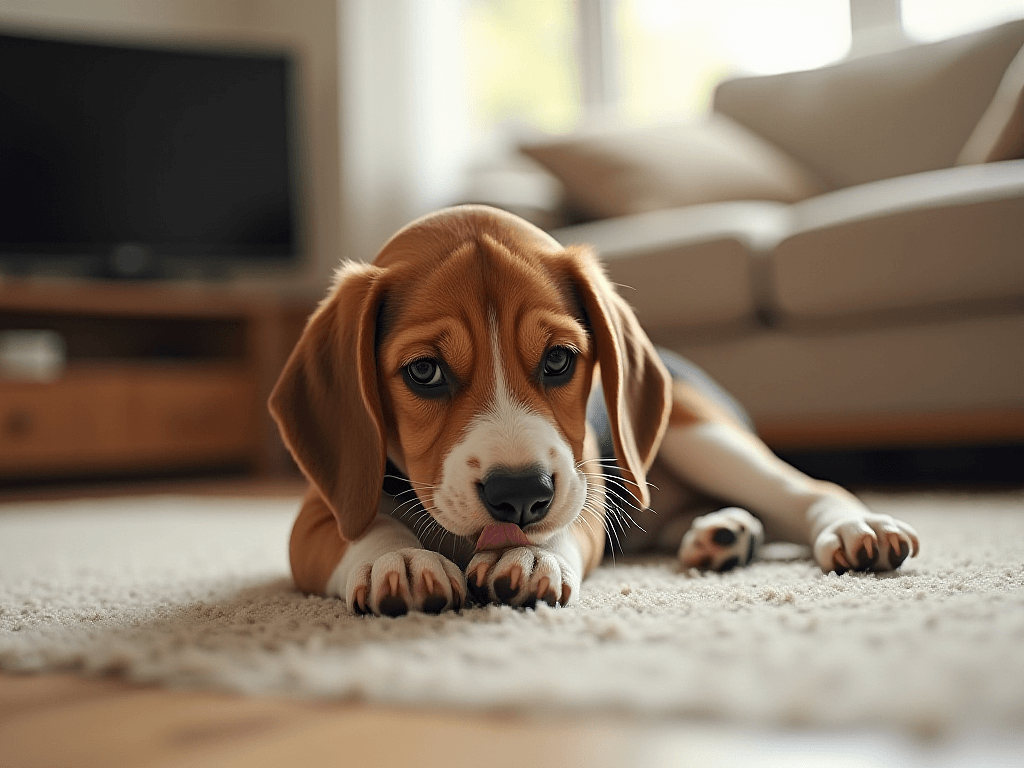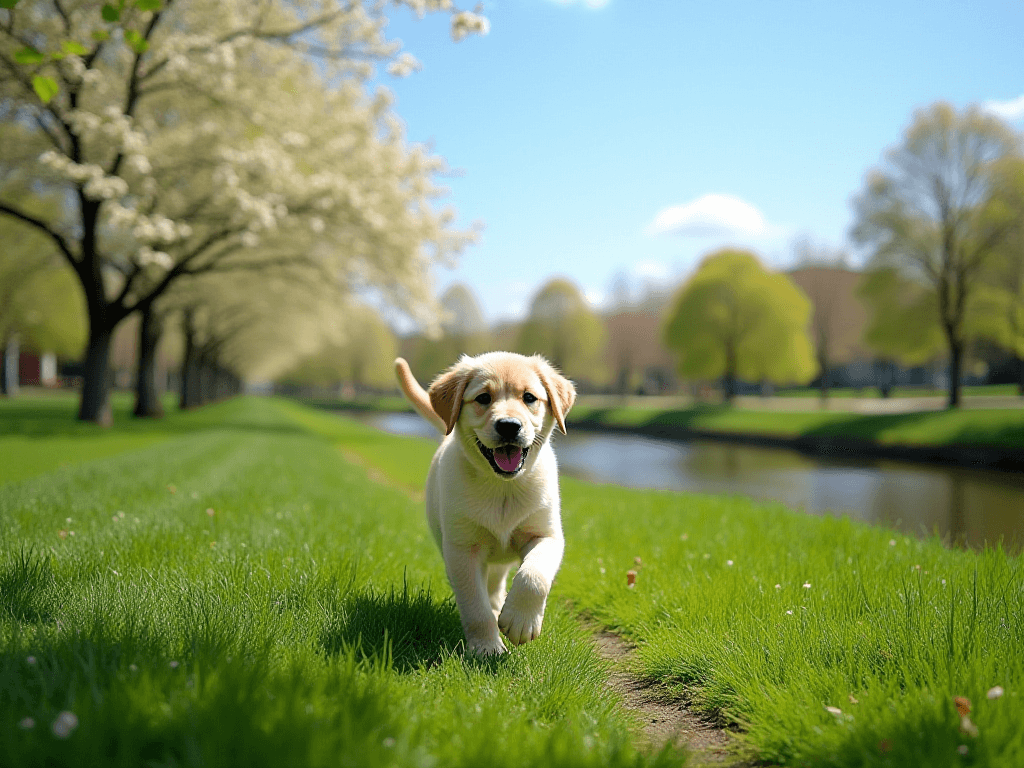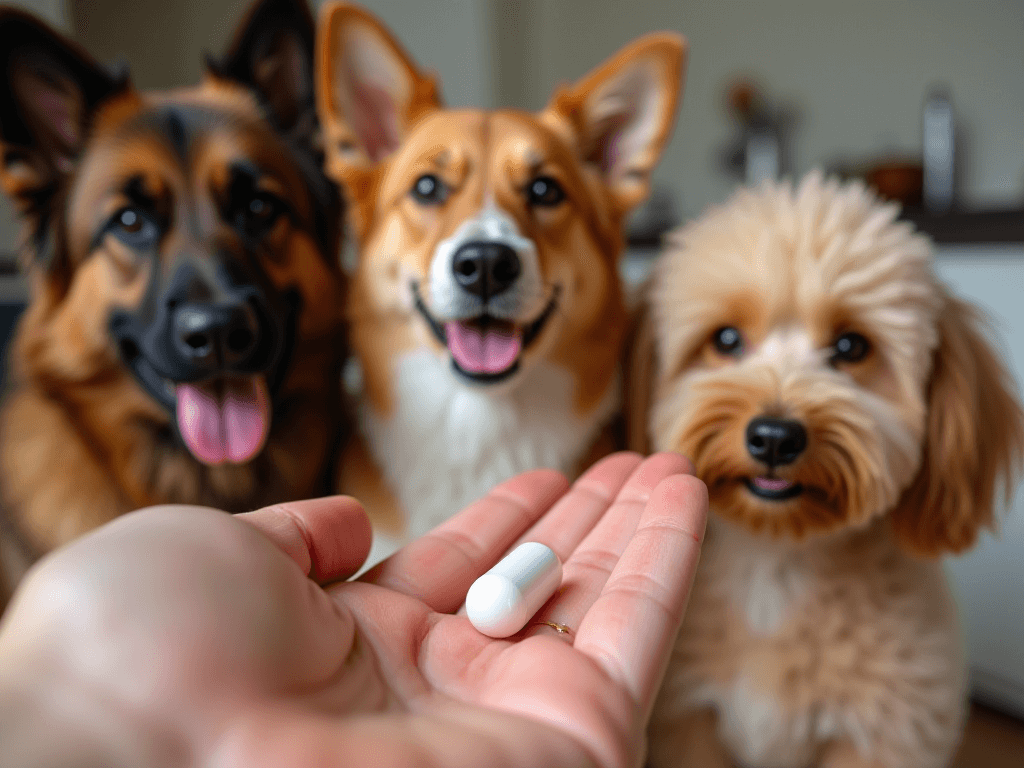It’s normal for dogs to lick their paws occasionally, but when does it cross the line into something more concerning? Many pet owners will often ask themselves, “Why does my dog lick their paws so much?” In most cases, excessive paw licking is a sign of an underlying issue, whether it’s allergies, stress, or something else entirely.
In this article, we’ll explore 10 common causes and offer effective treatment options. Supporting your dog’s overall health, including gut health, can play a key role in reducing paw licking, and certain supplements may help address some of the root causes naturally.
10 Reasons Why Dogs Lick Their Paws
1. Allergies
Allergies are one of the most common reasons for excessive paw licking in dogs. Whether the culprit is environmental (pollen, dust, or mold), food-related, or caused by contact with certain chemicals, allergies can make a dog’s paws itchy and uncomfortable.
RELATED: Do Probiotics Help Dogs With Allergies?
In response, dogs will lick or chew their paws to try and soothe the irritation. Over time, this constant licking can lead to inflammation, redness, or even infections if left untreated.
When allergies are at play, the cycle of licking and irritation can sometimes be linked to internal factors, such as imbalances in gut health.
Dogs with a weakened immune system or poor gut health are often more susceptible to allergic reactions, which can worsen paw-licking behaviors.
If you’ve noticed dog chewing paws, improving their gut health is an important part of the solution. Supplements like PetOptimum Probiotics for Dogs can help support a healthy immune system and gut, potentially reducing allergic reactions and helping to manage excessive paw licking.
2. Dry Skin
Dry skin is a common issue that can lead to excessive paw licking in dogs, especially during colder months. Low humidity, harsh winds, and exposure to snow, ice, or salt on the ground can dry out a dog’s skin, causing discomfort and irritation.
When a dog’s paws become dry or cracked, they may lick them in an attempt to relieve the itchiness or soothe the irritation. Over time, this behavior can make the skin even more sensitive, leading to a cycle of persistent licking and further irritation.
Why Do Dogs Lick Their Paws In Winter?
The colder months can be especially tough on your dog’s skin, and many pet owners notice their dogs licking their paws more frequently during winter. This behavior is often a response to the dry, cold air, or from exposure to ice-melting chemicals on sidewalks and roads.
Keeping your dog’s paws moisturized with paw balms and rinsing them after outdoor walks can help prevent the dry skin that leads to excessive licking during the winter months.
CHECK OUT: Should I Give My Dog Probiotics Every Day?
3. Infections
Infections are a common reason for paw licking in dogs. Bacterial, fungal, or yeast infections can develop on your dog’s paws, especially if they’ve been licking or chewing them excessively.
This can create a cycle: the more your dog licks, the more irritated the skin becomes, making it easier for infections to take hold. Symptoms of an infection may include redness, swelling, a foul odor, or discharge from the paw area.
If you suspect an infection, it’s important to seek veterinary care. Left untreated, these infections can worsen, causing further discomfort and leading to more paw licking. Regularly cleaning your dog’s paws and keeping an eye out for early signs of infection can help prevent this cycle from escalating.
4. Anxiety or Stress
Just like humans, dogs can experience anxiety and stress, which may manifest in behaviors such as excessive paw licking.
This is particularly common when they’re dealing with changes in routine, new environments, separation anxiety, or simply boredom. Licking is a self-soothing behavior, helping dogs feel more secure in situations that cause them stress.
However, when this becomes habitual, the constant licking can lead to skin irritation, inflammation, or even infections over time.
If you’ve noticed your dog licking their paws more frequently at night, especially before sleep, it might leave you wondering what’s behind this behavior.
DON’T MISS: Can Dogs Take Human Probiotics?
Why Do Dogs Lick Their Paws Before Bed?
Licking their paws before bed is a common way for dogs to calm themselves down and settle in for the night.
This behavior is often linked to anxiety or the need for comfort, especially if your dog is having difficulty relaxing or if there have been recent changes in their environment. Identifying and addressing these stressors can help reduce this pre-bedtime paw licking.
5. Dog Licking Paws and Itching from Parasites
Parasites like fleas, ticks, and mites are common culprits behind itching and discomfort in dogs. When these pests bite, they can cause intense irritation, leading to your dog licking their paws in an attempt to soothe the itch. In some cases, this licking can escalate to your dog biting paws as they try to find relief from the irritation.
Left untreated, this behavior can result in skin infections or further inflammation. Regular flea and tick prevention treatments are essential in stopping the cycle of itching and paw licking.
Additionally, keeping your dog’s paws clean and monitoring for signs of parasites can help minimize the risk of irritation. If you notice persistent licking or biting, it’s important to consult your vet for appropriate treatment to ensure your dog remains comfortable and itch-free.
6. Injuries
When dogs injure their paws—whether it’s from stepping on sharp objects, burns from hot pavement, or even small cuts—they will instinctively lick the area to soothe the pain and try to heal the wound. While this is a natural response, excessive licking can sometimes worsen the injury or lead to infections. Regularly checking your dog’s paws for any visible signs of injury is important, especially if you notice your dog focusing on one paw.
If you’re wondering, “Why do dogs keep licking their paws?” after an injury, it’s likely because the wound is still causing them discomfort.
In these cases, using a protective covering or applying a vet-recommended ointment can help speed up healing and reduce the licking behavior.
7. Foreign Objects
Sometimes, small foreign objects like tiny stones, thorns, grass, or road salt can get stuck between a dog’s paw pad during walks or outdoor play. These can cause discomfort or irritation, leading dogs to lick their paws in an attempt to remove whatever is stuck. If the object is lodged deeper, or if it causes a cut or abrasion, the licking can become more intense.
If you’re noticing that your dog won’t stop, you might be asking yourself, “Why do dogs aggressively lick their paws?” This aggressive licking is often a sign that something is bothering them, like a foreign object they can’t dislodge on their own.
After walks, especially in rough terrain or during the winter, regularly checking your dog’s paws and keeping their paws clean can help prevent this issue from escalating.
8. Nutritional Deficiencies
A well-balanced diet is essential for maintaining your dog’s skin and coat health. When dogs are missing key nutrients, such as omega fatty acids, vitamins, or minerals, their skin can become dry and irritated, prompting them to lick their paws in an attempt to soothe the discomfort. Nutritional deficiencies can also weaken the immune system, making the skin more prone to infections or inflammation, which can lead to excessive licking.
You may wonder, “Why do dogs lick their paws a lot?” when their diet is lacking. Ensuring your dog receives proper nutrition, and adding supplements like PetOptimum Probiotic For Dogs, which support overall gut health, can help address deficiencies and reduce paw licking caused by skin irritation or inflammation.
9. Behavioral Issues
Sometimes, paw licking isn’t related to a physical issue but rather a behavioral one. Dogs can develop compulsive habits, such as excessive licking, when they’re under-stimulated, bored, anxious, or stressed.
If a dog isn’t getting enough mental stimulation or exercise, they might start licking their paws to relieve boredom, pass the time, or manage the stress caused by pent-up energy. Over time, this behavior can become ingrained, even if there’s no longer a specific trigger.
If you’re wondering, “Why do dogs continuously lick their paws?” it could be related to these behavioral factors. Providing your dog with regular exercise, interactive toys, puzzles, and engaging activities can help redirect their focus and reduce the urge to lick their paws excessively.
10. Joint Pain or Arthritis
As dogs age, they may experience joint pain or arthritis, which can lead to paw licking as a response to discomfort. In particular, older dogs tend to focus on their front paws because they bear more weight on them, especially when getting up or lying down. The repetitive licking may be their way of trying to soothe the aching joints or reduce inflammation.
If you’ve been asking, “Why do dogs lick their front paws?” it could be due to underlying joint pain or arthritis. If this is the case, consulting with a veterinarian to explore pain management options, such as joint supplements, pain relief, or medications, can help manage the discomfort, reduce the licking, and improve your dog’s comfort.
How To Stop My Dog From Licking Its Paws
Once you’ve identified the cause of your dog’s excessive paw licking, treatment becomes much simpler. Here are some steps you can take:
- Manage allergies by identifying triggers and adjusting your dog’s diet or environment.
- Groom regularly to keep your dog’s paws clean and moisturized, especially during winter months.
- Prevent parasites by using flea and tick treatments.
- Use supplements like PetOptimum Probiotic Chews for Dogs, which can support gut health and address some of the underlying causes of excessive paw licking.
Home Remedies For Dogs Licking Their Paws And Prevention Tips
Excessive paw licking in dogs can often be managed with simple home remedies and preventive measures. By being proactive in caring for your dog’s paws, you can help reduce irritation and discomfort.
You might also like: Prebiotics And Probiotics For Dogs – What’s The Difference?
Dog Paw Care Tips
Here are some effective ways to address the issue:
- Regular Cleaning: After walks, gently wipe your dog’s paws with grooming wipes or wash his paws with water and mild, dog-safe soap to remove any allergens, dirt, or irritants that may cause them to lick.
- Soothing Paw Balm and Moisturize Regularly: Apply a paw balm regularly to keep the paws moisturized, especially during dry weather or after exposure to harsh surfaces like hot pavement or snow.
- Protect Paws: In extreme weather conditions, consider using dog boots or paw wax to protect their paws from heat, cold, or rough terrain.
- Daily Inspections and Grooming: Regularly check for any foreign objects, cuts, or abrasions on your dog’s paws. Also, trim the fur between their paw pads and keep their nails clipped to avoid debris getting trapped.
- Nutritional Supplements: A well-balanced and nutritious diet with supplements that support skin health can help reduce paw irritation, as poor nutrition can lead to dry, irritated skin, which often results in excessive licking. Adding probiotics like PetOptimum Probiotics for Dogs can aid in overall gut and immune health, which may contribute to healthier skin and reduced paw licking.
Final Thoughts: Why Do Dogs Lick At Their Paws?
Excessive paw licking in dogs is often a sign that something more is going on beneath the surface. From allergies and injuries to stress or nutritional deficiencies, identifying the root cause is essential to providing the right care.
Occasional licking is normal, but if your dog is licking their paws excessively, it’s time to take a closer look at your dog’s health and environment. By staying proactive with regular grooming, checking for injuries, and ensuring your dog’s diet supports healthy skin and coat, you can help reduce this behavior.
Adding probiotics supplements to your dog’s routine can also promote gut health and boost their immune system, which may address some underlying causes of paw licking. Ultimately, a combination of preventive care and attention to your dog’s needs will help keep them healthy and comfortable, minimizing the need for excessive paw licking.



